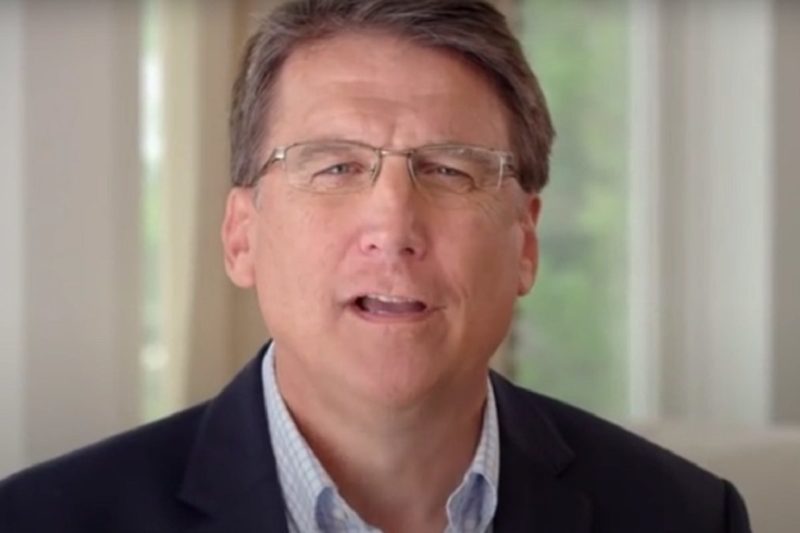Challenger Declares Victory Over North Carolina Governor Who Backed Anti-LGBTQ ‘Bathroom Bill’
Gov. Pat McCrory (R) signed HB 2, a sweeping anti-LGBTQ law that included a provision seeking to prohibit transgender people from using restrooms and locker rooms that match their gender identity.

North Carolina Attorney General Roy Cooper (D) declared victory in the state’s gubernatorial race, while incumbent Republican Gov. Pat McCrory said the contest would come down to provisional ballots.
The recount of the provisional ballots will be held November 18, according to WSOCTV. Cooper leads the incumbent governor by about 5,000 votes after Tuesday’s vote.
Leading up to election day, polls confirmed Cooper and McCrory would be in a close race, pitting a staunch anti-choice incumbent against the state’s Democratic attorney general.
McCrory signed HB 2, a sweeping anti-LGBTQ law that included a provision seeking to prohibit transgender people from using restrooms and locker rooms that match their gender identity.
HB 2, known as the “bathroom bill,” weighed heavily in the governor race, triggered lawsuits, and drew criticism from people and businesses. Early exit polls from ABC News showed that 66 percent of voters in the state opposed HB 2, while 29 percent supported it.
McCrory said during his 2012 run for governor that he would not support additional abortion restrictions, but went against his word after his term began.
A former Charlotte mayor and supporter of president-elect Donald Trump, McCrory signed a motorcycle safety bill amended with anti-choice restrictions that banned sex-selective and telemedicine abortions, and abortion coverage in North Carolina’s health insurance exchange. The anti-choice measure also allowed physicians, nurses, and health-care providers who oppose abortion rights to refuse to participate in medical procedures that result in abortion.
North Carolina’s Republican-majority legislature, with McCrory’s support, extended the state’s abortion waiting period to 72 hours.
He also signed a bill in 2013 that requires health teachers to distribute medically inaccurate information about abortion care to seventh-grade students in the state. That law requires educators to tell students that abortion, like drug and alcohol abuse and a lack of prenatal care, could result in a premature birth.
The Republican governor signed a bill in October 2015 that made “permanent this year’s state budget provision that prevents groups that perform abortions from receiving certain state funds aimed at family planning and pregnancy prevention,” according to the Associated Press. The measure banned the sale of fetal tissue in the state—though federal law already prohibits it—based on the discredited videos released by the anti-choice Center for Medical Progress.
McCrory signed a discriminatory voter ID law, which was later struck down in the courts.
Now in his fourth term as the state’s attorney general, Cooper’s legacy includes defending state laws—including those that may he may personally oppose.
Cooper, who identifies as pro-choice has a mixed record on defending abortion rights as attorney general.
“I strongly support a woman’s right to choose. I have opposed new restrictions on abortions and access to women’s comprehensive reproductive health and would have vetoed measures that restricted this access,” Cooper wrote in a letter published in March in the alternative weekly paper, Indy Week. “Healthcare decisions should be made between a patient and a doctor, not politicians or state government.”
Cooper told the pro-choice political group Lillian’s List that he opposed “the voice of politicians” in the “medical examining room telling the doctor what to say,” according to a 2015 account from the Winston-Salem Journal.
Despite these statements, Cooper petitioned the Supreme Court to review a federal appeals court ruling that struck down the state’s forced ultrasound law. Cooper had said the ultrasound law “is “perfectly consistent with the First Amendment, as a reasonable regulation of medical practice.”
A federal district court permanently blocked the law in 2014.
Cooper on his campaign website said he would push to reinstate same-day voter registration, expand early voting, advocate for online voter registration, and reverse voter ID measures.
He opposed HB 2 and North Carolina GOP lawmakers’ decision to not expand Medicaid as part of the Affordable Care Act.
An analysis by nonpartisan consulting firm Avalere Health released this month suggested a Cooper win could lead to Medicaid expansion in North Carolina.
